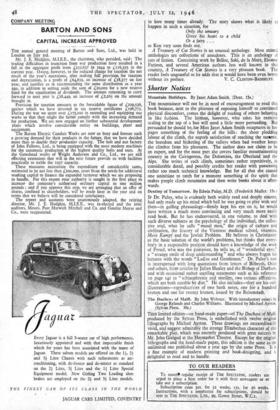Destiny of Tomorrow. By Edwin Pulay, M.D. (Frederick Muller; 15s.)
IF Dr. Pulay, who is evidently both widely read and deeply sincere, had only made up his mind which ball he was going to play with and then—in golfing phraseology—firmly kept his eye_ on it, he would have written a much more convincing and very much more easily read book. But he has endeavoured, in one volume, to deal with such diverse subjects as the psychology of the individual,' the collec- tive soul, what he calls " musal man," the origin of culture and civilisation, the history of the Viennese medical school, vitamins, Mein Kampf and the Jewish Problem. He believes in Christianity as the basic solution of the world's problems, but thinks that every- body in a responsible position should have a knowledge of the work of Freud, who was the posiesior, he tells 'us, of " wonderful eyes," a " strange smile of deep understanding " and who always began his lectures with 'the words "Ladies and Gentlemen." , Dr. Pulay's text is interspersed with long quotations from letters of Bilbroth, Osier and others, frOirrarticles by Julian Hmiley and the Bishop of Durham, and with. occasional rather startling statements such as his reference on page 141 to " schizophrenia and sterility, two serious afflictions, which are both curable by diet." He also includes—they are his only illustrations—reproductions of two bank notes, one for a hundred kronen and one for twenty kronen, issued by the Reisenstadt. -






























 Previous page
Previous page